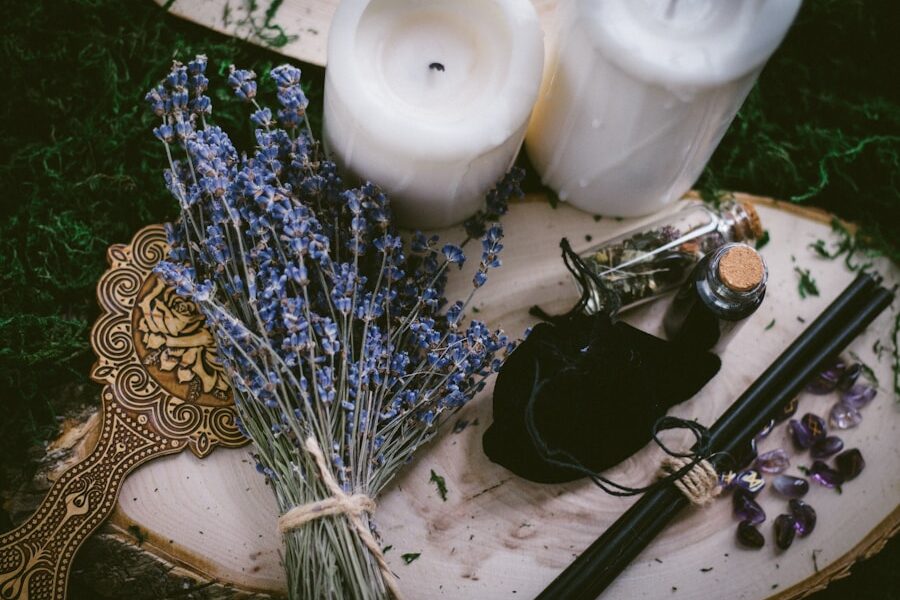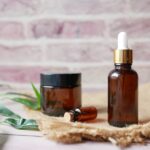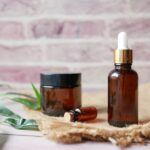In today’s fast-paced world, it’s more important than ever to prioritize self-care and relaxation. With the constant demands and stressors of daily life, finding ways to unwind and relax is crucial for our overall well-being. One powerful tool that can help us achieve a state of relaxation is essential oils. These natural plant extracts have been used for centuries for their therapeutic properties, including their ability to promote relaxation and reduce stress.
Essential oils have gained popularity in recent years as people seek natural alternatives to support their health and well-being. These oils are highly concentrated extracts derived from plants, such as flowers, leaves, bark, and roots. They contain the aromatic compounds that give plants their distinct scents and are known for their therapeutic benefits.
What are Essential Oils and How Do They Work?
Essential oils are extracted from plants through various methods, including steam distillation, cold-press extraction, and solvent extraction. The specific method used depends on the plant and the desired oil. Once extracted, essential oils retain the natural fragrance and therapeutic properties of the plant.
When inhaled or applied topically, essential oils interact with the body through several mechanisms. The molecules in essential oils can stimulate the olfactory system when inhaled, sending signals to the brain that can affect emotions and mood. When applied topically, essential oils can be absorbed through the skin and enter the bloodstream, where they can have systemic effects on the body.
The Science Behind Essential Oils and Stress Relief
Stress is a natural response to perceived threats or challenges, but chronic stress can have detrimental effects on our physical and mental health. Essential oils have been shown to have calming and relaxing effects on the body, making them effective tools for stress relief.
Research has shown that certain essential oils can help reduce stress by modulating the body’s physiological responses. For example, lavender essential oil has been found to have anxiolytic (anti-anxiety) effects, reducing anxiety and promoting relaxation. Studies have also shown that inhaling bergamot essential oil can reduce stress and improve mood.
Scientific studies have provided evidence for the effectiveness of essential oils in reducing stress. A study published in the Journal of Alternative and Complementary Medicine found that inhalation of lavender essential oil reduced stress and anxiety levels in participants. Another study published in the Journal of Ethnopharmacology found that inhalation of bergamot essential oil reduced cortisol levels, a hormone associated with stress.
Top Essential Oils for Stress Relief and Relaxation
1. Lavender: Lavender essential oil is one of the most popular oils for relaxation. It has a calming scent that can help reduce anxiety and promote better sleep. Lavender oil can be diffused, applied topically, or added to bathwater for a relaxing experience.
2. Chamomile: Chamomile essential oil is known for its soothing properties. It can help calm the mind and promote relaxation. Chamomile oil can be diffused or applied topically to help reduce stress and anxiety.
3. Bergamot: Bergamot essential oil has a citrusy scent that is uplifting and refreshing. It can help reduce stress and improve mood. Bergamot oil can be diffused or applied topically to promote relaxation.
4. Ylang-ylang: Ylang-ylang essential oil has a sweet floral scent that is known for its calming effects. It can help reduce anxiety and promote relaxation. Ylang-ylang oil can be diffused or applied topically to enhance relaxation.
5. Frankincense: Frankincense essential oil has a woody and earthy scent that is grounding and calming. It can help reduce stress and promote a sense of tranquility. Frankincense oil can be diffused or applied topically to support relaxation.
How to Use Essential Oils for Maximum Benefits
There are several ways to use essential oils for maximum benefits:
1. Inhalation: Inhaling essential oils is one of the most common methods of use. You can add a few drops of essential oil to a diffuser or inhale directly from the bottle. Inhalation allows the aromatic compounds in the oils to interact with the olfactory system and affect emotions and mood.
2. Topical application: Applying essential oils topically allows them to be absorbed through the skin and enter the bloodstream. It’s important to dilute essential oils with a carrier oil, such as coconut oil or jojoba oil, before applying them to the skin. This helps prevent skin irritation and allows for better absorption.
3. Diffusion: Using a diffuser is a popular way to enjoy the benefits of essential oils. A diffuser disperses the oils into the air, allowing you to inhale them and experience their therapeutic effects. Diffusing essential oils can create a calming and relaxing atmosphere in your home or workspace.
4. Internal use: Some essential oils can be taken internally, but it’s important to use caution and consult with a qualified aromatherapist or healthcare professional before doing so. Not all essential oils are safe for internal use, and proper dosage is crucial.
Aromatherapy: The Art of Using Essential Oils for Relaxation
Aromatherapy is the practice of using essential oils for therapeutic purposes. It has been used for centuries to promote relaxation, improve mood, and support overall well-being. Aromatherapy can be incorporated into your relaxation routine in various ways.
One way to incorporate aromatherapy into your relaxation routine is by using a diffuser. Diffusing essential oils can create a calming and soothing atmosphere in your home or workspace. You can choose oils that promote relaxation, such as lavender or chamomile, and diffuse them throughout the day or during specific relaxation times.
Another way to enjoy the benefits of aromatherapy is by adding essential oils to your bathwater. Adding a few drops of lavender or ylang-ylang essential oil to your bath can create a luxurious and relaxing experience. The warm water helps to release the aromatic compounds in the oils, allowing you to inhale them and experience their therapeutic effects.
You can also create your own massage oil by diluting essential oils with a carrier oil, such as coconut oil or jojoba oil. Massage is a great way to relax and unwind, and adding essential oils to your massage oil can enhance the experience. Choose oils that promote relaxation, such as lavender or bergamot, and apply them to your skin during your massage.
Essential Oils for Meditation and Yoga
Meditation and yoga are practices that promote relaxation, reduce stress, and improve overall well-being. Essential oils can enhance these practices by creating a calming and soothing environment.
When practicing meditation or yoga, you can diffuse essential oils that promote relaxation, such as lavender or frankincense. The scent of these oils can help calm the mind and create a peaceful atmosphere. You can also apply diluted essential oils to your skin before or during your practice to enhance relaxation.
Some essential oils have grounding properties that can help you feel more centered and focused during meditation or yoga. Oils such as sandalwood or vetiver can be diffused or applied topically to help you feel more grounded and present in the moment.
Essential Oils for Better Sleep and Insomnia
Sleep is essential for our overall health and well-being. Lack of sleep can contribute to increased stress levels, decreased cognitive function, and a weakened immune system. Essential oils can help improve sleep quality and promote better rest.
Lavender essential oil is one of the best oils for promoting better sleep. Its calming scent can help relax the mind and body, making it easier to fall asleep and stay asleep. You can diffuse lavender oil in your bedroom before bedtime or apply it topically to your wrists or the soles of your feet.
Chamomile essential oil is another oil that is known for its sleep-inducing properties. It has a soothing scent that can help calm the mind and promote relaxation. Diffusing chamomile oil in your bedroom or adding a few drops to your pillowcase can help improve sleep quality.
Other essential oils that can promote better sleep include bergamot, ylang-ylang, and frankincense. These oils have calming and relaxing effects on the body, making them effective tools for improving sleep.
Essential Oils for Anxiety and Depression
Anxiety and depression are common mental health conditions that can have a significant impact on our daily lives. Essential oils can be used as a complementary therapy to help manage symptoms of anxiety and depression.
Lavender essential oil is one of the best oils for anxiety and depression. Its calming scent can help reduce anxiety and promote relaxation. You can inhale lavender oil directly from the bottle or diffuse it throughout the day to experience its therapeutic effects.
Bergamot essential oil is another oil that has been shown to have mood-enhancing properties. Its citrusy scent can help uplift the mood and reduce symptoms of depression. Diffusing bergamot oil or applying it topically to the wrists or temples can help improve mood and promote a sense of well-being.
Other essential oils that can help manage anxiety and depression include chamomile, ylang-ylang, and frankincense. These oils have calming and soothing effects on the body, making them effective tools for managing symptoms of anxiety and depression.
Essential Oils for Headaches and Migraines
Headaches and migraines are common conditions that can be debilitating and affect our daily lives. Essential oils can help alleviate symptoms of headaches and migraines and provide relief.
Peppermint essential oil is one of the best oils for headaches and migraines. It has a cooling and soothing effect that can help relieve pain and reduce inflammation. You can apply diluted peppermint oil to your temples or the back of your neck to alleviate headache symptoms.
Lavender essential oil is another oil that can help relieve headaches and migraines. Its calming scent can help relax the mind and body, reducing tension and promoting pain relief. You can inhale lavender oil directly from the bottle or apply it topically to your temples or the back of your neck.
Other essential oils that can provide relief from headaches and migraines include eucalyptus, rosemary, and chamomile. These oils have analgesic properties that can help reduce pain and promote relaxation.
Incorporating Essential Oils into Your Relaxation Routine
Incorporating essential oils into your relaxation routine can have numerous benefits for your overall well-being. Whether you’re looking to reduce stress, improve sleep, manage anxiety and depression, or alleviate headaches, essential oils can be powerful tools for relaxation.
To incorporate essential oils into your daily routine, start by choosing oils that resonate with you and promote relaxation. Experiment with different methods of use, such as inhalation, topical application, diffusion, or internal use (with caution). Pay attention to how the oils make you feel and adjust your routine accordingly.
Remember to prioritize self-care and relaxation in your daily life. Take time for yourself to unwind and recharge. Incorporating essential oils into your relaxation routine can be a simple yet effective way to support your overall well-being in today’s fast-paced world.



